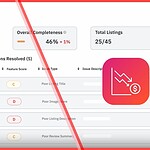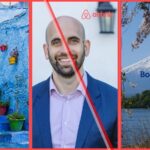Between coordinating cleanings, chasing maintenance updates, and managing owner expectations, most short-term rental (STR) property managers spend their days putting out fires. Somewhere in the middle of it all, the heart of the business, hospitality, personal touch often gets lost.
For Michael LeClerc, Founder of SkyRun Vacation Rentals in Park City, Utah, hospitality has always come first. In this conversation with Uvika Wahi from RSU by PriceLabs, Michael shares how joining SkyRun’s hybrid franchise model has helped him scale while staying focused on hospitality and guest experience.
Drawing on over a decade of experience managing more than 100 properties in a competitive, ski-driven market, we’ve outlined the key lessons and takeaways that property managers can learn from his journey.
From Chef to Property Manager: The Roots of Hospitality
Before managing STRs, Michael spent years working as a professional chef in Michelin-starred restaurants across Europe and New York. The discipline, attention to detail, and pride in doing things right, even when no one is watching, shape how he runs his business today.
Those same values now define SkyRun Park City’s approach: blending high-touch hospitality with local expertise and operational efficiency. Michael’s team manages everything from two-bedroom condos to luxury ski-in, ski-out homes across Park City and Deer Valley, catering to discerning travelers who value both comfort and convenience.
Inside the Hybrid Franchise Model: How It Helped SkyRun Park City Scale Smarter
A hybrid franchise model blends the independence of a local business with the consistency and resources of a larger brand. Franchisees manage day-to-day operations and guest service, while the franchisor provides the backbone: technology, marketing, and training.
SkyRun follows this exact approach. For Michael LeClerc, it removed many early operational hurdles, allowing him to focus on hospitality and local service while SkyRun’s central team handled marketing, onboarding, and tech. As his business grew, Michael became part of a strong network of franchise owners exchanging ideas and solutions across markets. Over time, he also became a partner at the franchisor level, gaining insight into how the model empowers both local operators and the broader brand.
Takeaway for Property Managers:
A franchise model can fast-track growth by giving you access to tested systems, marketing infrastructure, and a peer network, allowing you to focus on delivering great service instead of building every process from scratch.
Who the Franchise Model Isn’t For
While the hybrid franchise model offers strong support and structure, Michael is clear that it’s not for everyone.
He explains that this approach works best for property managers who value collaboration, consistency, and shared systems, not for those who prefer full control over every process. Independent operators who enjoy building everything from scratch or already manage a large portfolio with established tech stacks may find less added value in a franchise framework.
Similarly, those uncomfortable with relying on centralized systems or following brand-wide standards might struggle with the structure that makes franchising successful.
Takeaway for Property Managers:
If you prefer to stay entirely self-directed or already have robust operations in place, the model may not fit your long-term vision.
Building a Hospitality-First Team
SkyRun Park City’s biggest strength lies in its speed and responsiveness. With an in-house maintenance and inspection team, Michael’s staff can respond to issues within 15–20 minutes, something that consistently surprises guests.
This local advantage builds trust and loyalty. Guests quickly understand that the team isn’t managing properties from afar; they’re neighbors who know which ski slopes to avoid in the morning, or which side of the street gets the best afternoon sun.
Takeaway for Property Managers:
Invest in local expertise and empower your team. A fast, reliable response to guest issues is one of the easiest ways to differentiate your business and earn repeat stays.
Convenience as the New Definition of Value
In Park City and Deer Valley, Michael’s guests are often high-net-worth travelers who visit for just four or five days. As he explains, for them, time is the real luxury. They aren’t looking for discounts; they’re looking for simplicity.
That’s why SkyRun Park City’s model is built around bundled convenience. Instead of leaving guests to handle logistics, Michael’s team takes care of the details before they even arrive, including grocery shopping, ski rental deliveries, and any setup that saves time once they’re in town.
Every service is designed to give guests more time to spend with their family and friends, which is what they came for in the first place.
Takeaway for Property Managers:
Guests increasingly equate value with time saved. By bundling services such as pre-arrival preparation, local coordination, and rapid on-site support, property managers can enhance guest satisfaction and drive repeat bookings. This focus on convenience mirrors broader industry moves; Vrbo’s partnership with BabyQuip and Airbnb’s newly launched services both aim to bundle add-ons and make stays more seamless for guests.
Michael’s “Recipe for Success”
Drawing from his culinary roots, Michael developed what he calls a three-legged recipe for success: Treat your homeowners like business partners, your guests like friends, and your team like family. Give each the right care and attention, and the business grows naturally.
He emphasizes the importance of trusting and empowering employees, placing them in roles slightly above their comfort level so they can rise to the challenge. That confidence radiates back to guests and homeowners, creating a cycle of positivity and ownership.
Takeaway for Property Managers:
Hospitality is a team sport. Hire thoughtfully, delegate early, and nurture confidence in your staff, their sense of ownership directly affects guest satisfaction.
Lessons from Mistakes: Delegate Earlier, Scale Faster
Looking back, Michael says one of his biggest mistakes was trying to do too much himself in the early years. If he had trusted his team sooner and delegated key responsibilities, he believes SkyRun Park City could have scaled faster and with less stress.
Takeaway for Property Managers:
Don’t wait too long to build your core team. The earlier you delegate operations, sales, and maintenance, the faster your business can grow sustainably.
Keeping It Simple and Focused
As a seasoned operator, Michael warns against overcomplicating processes or chasing every new tool that appears on the market. Complexity, he says, is the enemy of progress.
Citing one of his favorite quotes, “Any fool can make things complicated; it takes real skill to keep them simple”, he advises property managers to focus on clarity, prioritize what truly matters, and chase excellence over shortcuts.
Takeaway for Property Managers:
Simplicity scales. Clear systems, defined goals, and a focus on quality will always outperform scattered efforts and shiny-object distractions.
Wrapping Up
For Michael LeClerc, success came from creating a company where structure and soul coexist. The hybrid franchise model gave him the systems to grow, but it’s his chef’s attention to detail and people-first philosophy that continue to define SkyRun Park City’s hospitality.
His story shows that with the right structure, you can have it all:
– The freedom of running your own local operation.
– The confidence of proven systems behind you.
– And the satisfaction of delivering true hospitality at scale.
Snigdha Parghan is a Content Marketer at RSU by PriceLabs, where she creates articles, manages daily social media, and repurposes news and analysis into podcasts and video content for short-term rental professionals. With a focus on technology, operations, and marketing, Snigdha helps property managers stay informed and adapt to industry shifts.








